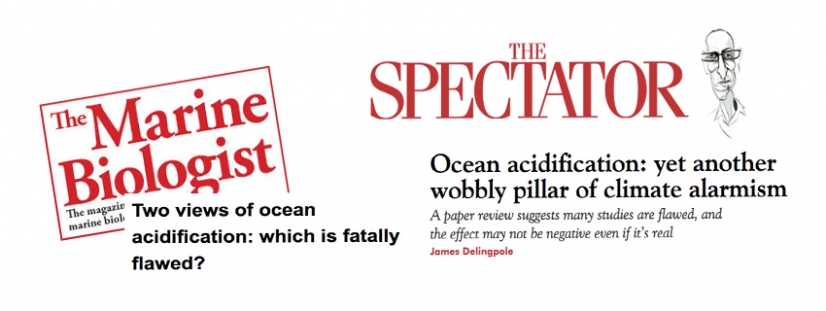Fraser Nelson is the editor of the flagship conservative publication, The Spectator, and he’s not all that happy when scientists complain to the UK’s press “regulator” about articles printed in his magazine.
“It’s odd that, in a nation which cherishes free speech, so many of those who disagree with articles feel the need to report an author to a regulator rather than write in and argue their own case,” Fraser told The Guardian.
Fraser was responding to scathing criticisms made by several scientists about an article he’d printed in April 2016 that unfairly disparaged the science of ocean acidification.
The writer of that article was climate science denier James Delingpole. The complainant was Dr Phil Williamson who, at the time, was science director of the UK government-funded Ocean Acidification Research Programme.
Many people might wonder why, as Fraser states, Williamson had not bothered to “write in” to The Spectator and argue his case?
Except that in trying to cast Williamson as a free speech-hater who would rather run to regulators than challenge the perpetrator, Fraser had forgotten to check something – a mistake that’s ironic, given the subject.
Williamson had in fact tried to argue his case and had sent two emails to the Spectator, four days apart, pointing out in detail the errors in Delingpole’s article and asking for a right of reply. Williamson did not get a response, so he complained to IPSO.
Shortly after, as reported in DeSmog, the magazine of the Marine Biologist published the material the Spectator would not even acknowledge receiving (when DeSmog tried to contact the Spectator for comment at the time, we received a similar non-response).
Delingpole’s article had claimed the science of ocean acidification was “fatally flawed” and that marine life had “nothing to fear” from the burning of fossil fuels.
Delingpole had built his article around the misinterpretation of facts and some claims from non-experts, including coal-funded climate science denier Patrick Moore.
Moore’s claims had already been meticulously torn apart by actual ocean acidification experts.
IPSO Not Interested In Facts
None of this matters either to the Spectator or, it seems, to IPSO, which used a series of twists and turns to throw out Williamson’s complaints.
In short, IPSO argued that Delingpole’s article was “comment” and, in any case, did not contain “any significant inaccuracies or misleading statements.”
Yet earlier in the finding, IPSO had written its role “is not to make findings of fact or to resolve conflicting evidence in relation to matters under debate.”
So to summarise: IPSO could not find significant inaccuracies, but its job is not to assess the facts anyway. Go figure.
Williamson told The Guardian: “Ipso’s overall message that ocean acidification is just a matter of opinion, not hard-won, testable knowledge is pernicious, with serious policy consequences.”
Fraser’s unfair characterisation of Williamson, based on a lack of understanding of the facts, just added further insult to injury.
On Carbon Brief, Williamson joined another scientist, Professor Terry Sloan, to outline IPSIO‘s impotencies.
Sloan had complained to IPSO about an article in The Telegraph written by climate science denialist Christopher Booker.
Booker’s article tried to argue that global temperature records were being corrupted and that the world wasn’t really experiencing record warmth.
IPSO also threw out Sloan’s complaint.
Williamson and Sloan wrote that in their view, IPSO “has neither the will nor the competence to properly investigate scientific complaints such as these.”
The pair added: “Ipso’s decision-making process (except in the most extreme circumstances) would seem to be based on finding a form of words to defend shoddy journalism on the basis of ‘free speech” arguments, regardless of the editors’ code. That is hardly in the public interest, and damages the reputation and credibility of Ipso as an independent regulator.”
Subscribe to our newsletter
Stay up to date with DeSmog news and alerts






